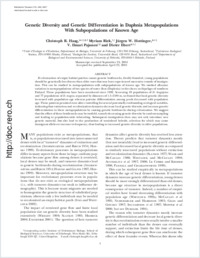Genetic diversity and genetic differentiation in Daphnia metapopulations with subpopulations of known age
- Haag, Christoph R. Ecology and Evolution, Department of Biology, University of Fribourg, Switzerland - Tvärminne Zoological Station, Hanko, Finland - Zoologisches Institut, Universität Basel, Switzerland - Department of Biological and Environmental Sciences, University of Helsinki, Finland
- Riek, Myriam Tvärminne Zoological Station, Hanko, Finland - Zoologisches Institut, Universität Basel, Switzerland
- Hottinger, Jürgen W. Ecology and Evolution, Department of Biology, University of Fribourg, Switzerland - Tvärminne Zoological Station, Hanko, Finland - Zoologisches Institut, Universität Basel, Switzerland
- Pajunen, V. Ilmari Tvärminne Zoological Station, Hanko, Finland - Department of Biological and Environmental Sciences, University of Helsinki, Finland
- Ebert, Dieter Ecology and Evolution, Department of Biology, University of Fribourg, Switzerland - Tvärminne Zoological Station, Hanko, Finland
-
03.06.2005
Published in:
- Genetics. - 2005, vol. 170, p. 1809
English
If colonization of empty habitat patches causes genetic bottlenecks, freshly founded, young populations should be genetically less diverse than older ones that may have experienced successive rounds of immigration. This can be studied in metapopulations with subpopulations of known age. We studied allozyme variation in metapopulations of two species of water fleas (Daphnia) in the skerry archipelago of southern Finland. These populations have been monitored since 1982. Screening 49 populations of D. longispina and 77 populations of D. magna, separated by distances of 1.5–2180 m, we found that local genetic diversity increased with population age whereas pairwise differentiation among pools decreased with population age. These patterns persisted even after controlling for several potentially confounding ecological variables, indicating that extinction and recolonization dynamics decrease local genetic diversity and increase genetic differentiation in these metapopulations by causing genetic bottlenecks during colonization. We suggest that the effect of these bottlenecks may be twofold, namely decreasing genetic diversity by random sampling and leading to population-wide inbreeding. Subsequent immigration then may not only introduce new genetic material, but also lead to the production of noninbred hybrids, selection for which may cause immigrant alleles to increase in frequency, thus leading to increased genetic diversity in older populations.
- Faculty
- Faculté des sciences et de médecine
- Department
- Département de Biologie
- Language
-
- English
- Classification
- Biological sciences
- License
-
License undefined
- Identifiers
-
- RERO DOC 5450
- DOI 10.1534/genetics.104.036814
- Persistent URL
- https://folia.unifr.ch/unifr/documents/299901
Statistics
Document views: 192
File downloads:
- Texte intégral: 236
